Faculty news and recognition updates
Biology student accepted to PhD program at the University of Mississippi
Imani Harris, a biology major with a concentration in botany, has recently been accepted into the Pharmaceutical Science PhD program at the University of Mississippi with a concentration in medicinal chemistry. After graduating from UM, Harris hopes to work in research focusing primarily on female medicine and pain relief.
Imani Harris
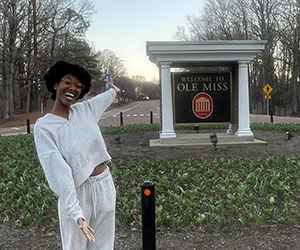
Biology professor and student awarded at conference.
Dr. Jason Bruck and biology graduate student, Sonny Schoenhoft, received first place in Research Advancements and the Outernet Technologies International Award at the 2025 International Marine Animal Trainer’s Association conference.
Schoenhoft also received the Best First Time Presenter Award for her work on deciphering beluga vocalizations in partnership with the Georgia Aquarium.
Dr. Jason Bruck
Associate Professor
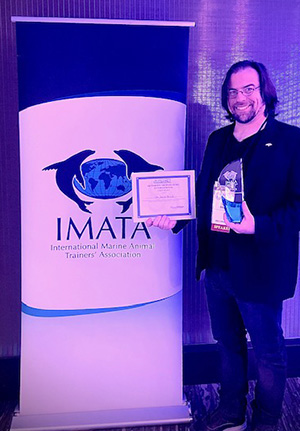
Sonny Schoenhoft
Graduate Student
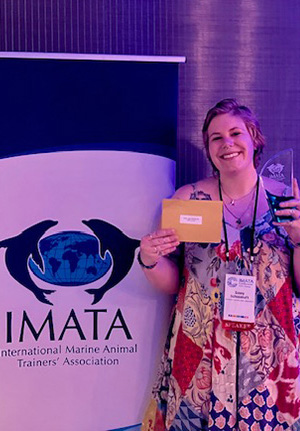
Biology professor and students awarded at statewide meeting for outstanding research in fisheries science
Dr. Carmen Montaña and seven students from the Department of Biology recently attended and presented at the 2025 Texas Chapter of the American Fisheries Society in College Station.
Research recognized:
Anastasia Umstott
Graduate Student
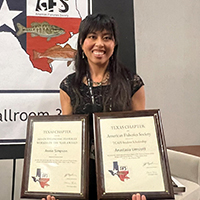
Recipient of a TCAFS scholarship.
Katelyn Defrancis
Undergraduate Student
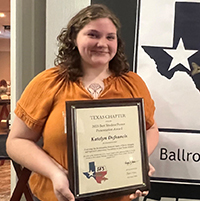
Dr. Carmen Montaña
Associate Professor
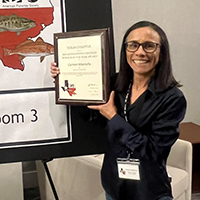
Dr. James Van Kley publishes piney woods plant manual
Van Kley, along with Nacogdoches illustrator Bruce Lyndon Cunningham, published Part 1 of the book “Herbaceous Plants of the Pineywoods of East Texas and Louisiana” in October.
This manual covers the non-woody herbaceous vascular Eudicotyledons, which are the largest of flowering plant groups, along with the herbaceous Magnoliids and waterlilies, known as Nymphaeids of the piney woods of East Texas and west Louisiana. Filling a major gap in earlier publications, this book marks the first time a local manual has offered comprehensive coverage of the entire flora for this region.
Dr. Daniel Bennett conducts bumble bee research
Bennett with SFA’s Department of Biology and Drs. David Kulhavy and Reuber Antoniazzi with the Arthur Temple College of Forestry and Agriculture are researching the diversity and health of East Texas bees. Together with students and colleagues, the faculty members are documenting the health of bumble bee populations across 74 East Texas counties.
Bumble bees are essential components of piney woods ecosystems and are crucial pollinators of various crops grown in the region. This state-funded research will provide a conservation status assessment for bees, such as the American bumble bee, an imperiled species in much of the United States. Interested students are encouraged to get involved.
Dr. Carmen Montaña leads international research trip to South America
Montaña led an international research expedition funded by National Science Foundation to study freshwater biodiversity in rivers in the Guiana Shield, a tropical region in South America.
The international collaborative research team included Drs. Brent Burt and James Van Kley, SFA biology faculty members; three SFA undergraduate students supported by the NSF’s International Research Experiences for Students program; as well as students and faculty from the University of Guyana and Texas A&M University.
The team conducted research for a month over the summer of 2023 by surveying freshwater habitats of the Rupununi River. Students received extensive training in research and sampling design, surveying of aquatic systems using different fishing methodologies, data collection, and specimens processing and preservation to address human impacts on aquatic ecosystems.
Bruck Lab is Awarded $55,000 in dolphin research/conservation funding
Dr. Jason Bruck, assistant professor of biology, was awarded two 2024 Dolphin Quest Conservation Grants to aid the study and conservation of dolphins. In partnership with Oklahoma State University’s Unmanned Systems Research Institute, the first grant is for the development of next generation hormone collecting drones for passive health assessments of wild dolphins. The second grant is for an exploration of how marine noise effects critical dolphin learning and memory tasks. Both grants will facilitate student research at SFA as part of the aquatic biology concentration.
Dr. Matthew Kwiatkowski publishes research in Environmental Pollution
Kwiatkowski published an article titled "Effects of anthropogenic light on anuran calling site" with his former graduate student, Ashley Kobisk, in the international journal Environmental Pollution. Their work investigated how light pollution impacts the calling behavior of frogs.
Their research found that light pollution acts as a form of habitat loss for frogs, limiting the locations available for the beginning stages of mating. The study is the first to demonstrate this effect across multiple species. Kwiatkowski is following up on these findings by investigating how light pollution affects frogs at the individual, population and community levels.
Dr. Jason Bruck publishes research in Animals
Bruck, assistant professor of biology, co-published a paper with Paige Stevens, a doctoral candidate working with Bruck Lab, in the journal Animals. The paper highlights how reintroduced noises related to human activity during the COVID-19 lockdown affected bottlenose dolphin attention and distractibility.
Dr. Carmen Montaña publishes research in Biological Invasions
Montaña and her former graduate student Erin Shepta, along with collaborators from Texas A&M University and the Texas Parks and Wildlife Department, published a new paper, "The ecological niche of native and invasive fish congeners in Texas streams: evidence from morphology, stable isotope analysis, and stomach contents analysis," in the journal Biological Invasions.
This new research used integrative approaches based on morphological traits, stable isotope analysis and dietary analysis to investigate multiple dimensions of the ecological niche between two native Texas fishes, Red River pupfish and the plains killifish, and their sympatric invasive relatives, sheepshead minnow and the gulf killifish. This research study, funded by TPWD, was conducted in the Brazos River and Red River basins in Texas.
 Axe ’Em, Jacks!
Axe ’Em, Jacks!